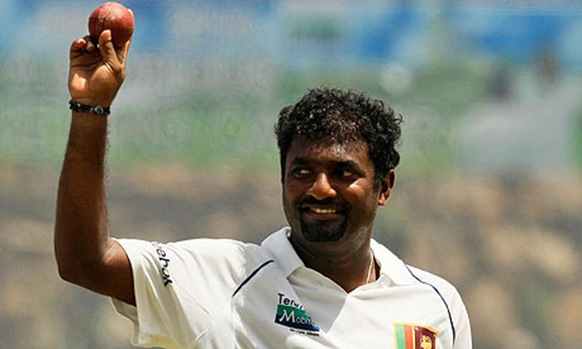 The Tamil people hoped Muttiah Muralitharan, now retired from Test cricket, would support their cause. Photograph: Eranga Jayawardena/AP
The Tamil people hoped Muttiah Muralitharan, now retired from Test cricket, would support their cause. Photograph: Eranga Jayawardena/AP
Around 2.45pm a yellow weather balloon bobbed up above the Lord’s pavilion. It had "Boycott Sri Lanka" scrawled on the side in thick black ink, and a Tamil flag tied around the rope that tethered it to the ground. Cricket has often been portrayed as something that has helped hold Sri Lankan society together in the last 30 years. Only this week Kumar Sangakkara described it as the "heal-all of Sri Lanka’s social evils". But this series is being played out to the sound of furious protests from London’s sizeable Tamil community, who are calling for the ECB to refuse to play against Sri Lanka until an independent investigation has been launched into allegations of war crimes committed by the government at the end of civil war in 2009. The UN estimates that 40,000 Tamil civilians were killed.
The idea that the national team rises above the rifts that run so deep in Sri Lankan society looks a little less convincing since Muttiah Muralitharan has retired. Murali was one of the few Tamils in the team, along with Angelo Mathews, who is currently injured. "We hoped Murali would say something to support the Tamil people but he ended up supporting President Rajapaksa," said Tamil spokesman Thusiyan Nandakumar. "At the time when the Tamil people were down and out, many people looked up to Murali to say something. And those people were disappointed when he did not. He was the only Tamil face out there who was recognised worldwide, but he has not even joined us in asking for an independent investigation." Several English politicians have, including David Cameron.
There were 50 protesters outside Lord’s. The police were a little underwhelmed by the turn-out. They had been expecting 300 to turn up. Either way, the MCC, unsurprisingly enough, had been a little unhappy about the idea of being picketed, though as one policeman ruefully admitted, "there’s not much they can do about it". The closest the MCC like to get to any kind of political clash is the annual match against the Lords and Commons. The club were assuaged by the police’s promise to put up barriers and provide protection. They need not have worried too much. Between the burble of polite conversation, the clinking of the champagne flutes and the brass bands belting out swing tunes, the cries of "Fight the genocide! Boycott Sri Lanka!" coming from the other side of the large red brick wall that runs along the St John’s Wood Road did not intrude too rudely on the members’ day out. They certainly did not make as big an impact as the six hit by Tillakaratne Dilshan into the lower tier of the pavilion, which struck an elderly spectator on the chest.
There will be more friction between the MCC and the Tamils later this summer, when Sangakkara gives the Colin Cowdrey Memorial lecture. "When Desmond Tutu gave the Cowdrey lecture in 2008 he said the finest demonstration of the spirit of cricket was England’s boycott of South Africa after the D’Oliveira affair," says Nandakumar. "Tutu said that politics impinges on sport as much as on any other aspect of life. 40,000 people have died in Sri Lanka. Morally it is not right to be playing in Sri Lanka and it seems oxymoronic that a Sri Lanka player will now be giving that same lecture." Tutu has also spoken out for the Tamils, describing the "ongoing persecution" as "truly terrifying".
(For updates you can share with your friends, follow TNN on Facebook and Twitter )
